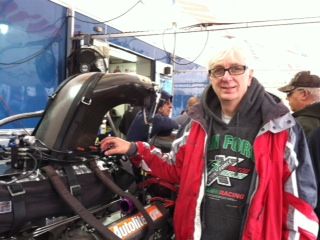Ah, combustion.
My wheelhouse.
It really depends on a lot of variables. The most important is probably the adiabatic flame temperature. You see, the by-products of combustion will vary depending on the flame temperature which determines the ksp of the combustion reaction. That's important because the heat addition will be a product of the energy released by the individual reactions creating the multiple by-products. In the theoretically perfect word we would combust a hydrocarbon with oxygen and get CO2 and H20 as products.
In the real world, we burn air, and thus we get may reactions happening at once determined by the flame temp. Since air is mostly nitrogen and gasoline isn't pure octane your exhaust really contains CO,CO2, NO, NO2, SO, SO2, H2SO4...
So to "dial in" the mixture you really need to be analyzing the exhaust gasses. (Note many light aircraft utilize a EGT gauge)
For racing motors on sports cars we run them slightly rich to make them run cooler and last bit longer. Where we set the mixture is a function of how long the race is. Some cars can adjust it during the race. The driver can lean out a bit and cruise at lower power to save fuel if that's part of the race strategy.
Methanol and juice (aka CH3NO2) together provide more oxygen. Typically we will run a nitro motor rich for a couple of reasons:
We run very close to hydraulic lock when the fuel is all the way up. Since all the fuel doesn't burn and we can take away a little HP on the hit at the cost of a little excess compression since fuel is incompressible until it gets heated up and boils into vapor. We run 100gpm fuel pumps so there's no shortage of nitro. It's coming into the engine like a fire hose.
If you watch fuel cars on TV or go to a race you can watch the crew chief. The car will be running lean during the burnout to get the heat up, after the driver backs up and gets read to stage the car the chief will turn the barrel valve to richen the car up. That's when the sound goes from pop-pop-pop to the menacing whop-whop-whop and the idle drops.
Second, the excess nitro will combust after it leaves the exhaust and give an orange flame. We can see immediately if we lost a cylinder. Also, for night exhibitions it makes the car look like a 320MPH roman candle...
Nitro and methanol burn cool. The long smoky burnouts you'll see fuel cars do is more about bringing the engine to temp than heating the tires. We run solid blocks with no cooling liquid.
Alcohol engines run so cool that it's very common to see frost forming on the injector butterfly as the car idles, even on a 90 degree day. You have to spray them with de-icer or they may freeze shut!
Anyway, I'm rambling but you can start to see the dance... you lean it out, the flame temp changes and combustion reaction(s) change and the power you get changes, not always for the better. It's a bit artsy-fartsey and then you get into the differences between each individual injector and it's head being slightly different due to the twists and turns of the fuel line. The final answer is always an average because each cylinder is slightly different. So richen it up to be safe.
Perfect Stoichiometry won't necessarily give you the highest RPM, it will give you the most power, but because we burn air and not pure oxygen and get mixed by-products of combustion it's not really applicable. It's a theoretical point rather than practical, i.e., in practice it's the domain of engineers and not scientists, lol!
